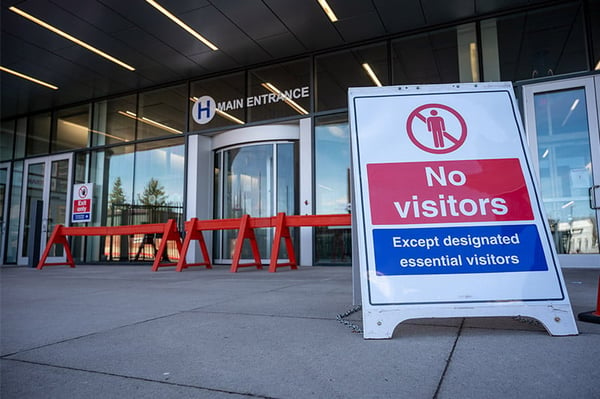Baker to Vegas: Leveraging Pulsara to Manage a Planned Event
Although they have the advantage of prior awareness and preparation, large-scale planned events pose unique challenges for emergency management...
2 min read
 Kinsie Clarkson
:
Jan 15, 2021
Kinsie Clarkson
:
Jan 15, 2021

This week, Ontario officials announced a second, more stringent stay-at-home order in an attempt to help mitigate the recent surge of COVID-19 cases in the province.
"According to officials, there is a real threat that the province’s hospital system could collapse under the pressure."
In a news conference in Toronto on January 14th, Ontario Premier Doug Ford stated, “Last week I stood here and I told you our province is in crisis. The facts are clear: Cases and deaths are the highest since the start of the pandemic and community spread continues to escalate.”
Canada’s second wave of COVID-19 is taking a worse toll the the first. The Public Health Agency of Canada announced that during the week of January 7th-13th, Canada experienced a national average of 7,727 new cases each day.
Over the past two weeks, Ontario has seen their COVID-19 cases double. Officials warned that one in every four ICUs in the province is already full. Data models shows that, if current trends continue, Ontario’s hospital ICUs will be overwhelmed within weeks. According to officials, there is a real threat that the province’s hospital system could collapse under the pressure.

"The latest modelling data shows that Ontario is in a crisis and, with the current trends, our hospital ICUs will be overwhelmed in a few short weeks with unthinkable consequences," said Premier Ford. "That's why we are taking urgent and decisive action, which includes declaring a provincial emergency and imposing a stay-at-home-order. We need people to only go out only for essential trips to pick up groceries or go to medical appointments. By doing the right thing and staying home, you can stay safe and save lives."
The stay-at-home order went into effect at 12:01 AM on Thursday, January 14th, requiring that residents remain at home unless venturing out for approved activities such as seeking healthcare, going to the grocery store or pharmacy, work that must be done in person, or exercising. The order is likely to last at least four weeks.
 "Despite our best efforts, COVID-19 is continuing to spread in our communities, our hospitals, our long-term care homes, and our workplaces,” said Christine Elliott, Deputy Premier and Minister of Health. “We are continuing to see concerning trends across the province, including a tragic number of deaths. We have made great strides in vaccinating tens of thousands of Ontarians, and we can't let these efforts go to waste. Urgent action is required to break this deadly trend of transmission, ensure people stay home, and save lives."
"Despite our best efforts, COVID-19 is continuing to spread in our communities, our hospitals, our long-term care homes, and our workplaces,” said Christine Elliott, Deputy Premier and Minister of Health. “We are continuing to see concerning trends across the province, including a tragic number of deaths. We have made great strides in vaccinating tens of thousands of Ontarians, and we can't let these efforts go to waste. Urgent action is required to break this deadly trend of transmission, ensure people stay home, and save lives."
Given the grim report on January 8th that 63,000 Canadians lost their jobs during the month of December, the shutdown doesn’t bode well for the recovering economy. However, as the stay-at-home order goes into effect, Ontario officials are moving forward with vaccination efforts, and hope to soon be able to start mass vaccinations. "We're doing everything we can to bring forward more doses, to accelerate the process," Canadian Prime Minister Justin Trudeau said in a January 12th news conference in Ottawa. "Because we know that the sooner we get as many Canadians as possible vaccinated, the sooner we get through this pandemic." Trudeau further promised that every Canadian who wanted to get the vaccine would be able to get it by September.
The province will also provide up to 300,000 COVID-19 tests every week to support schools, long-term care facilities, manufacturing, food processing, supply chain, and other essential industries. That works out to rapid test screening for about 150,000 essential workers each week for the next 4-5 months.
Ontario's Chief Medical Officer of Health, Dr. David Williams, urged citizens to work together to save lives —by staying home. "The trends in key public health indicators are continuing to deteriorate, and further action is urgently required to save lives. By strictly adhering to all public health and workplace safety measures, we can reduce the transmission of COVID-19 and keep our loved ones and our communities safe. It will take the collective efforts of us all to defeat this virus."
In response to the COVID-19, Canadian experts are calling for a united, system-wide telehealth infrastructure and training for physicians. Learn more here.

Although they have the advantage of prior awareness and preparation, large-scale planned events pose unique challenges for emergency management...

For Those Who Love a Good "Oopsie!" At Pulsara, we pride ourselves on enabling secure, HIPAA-compliant communication for healthcare teams. But let’s...

March Recap A New Integration: Improving Data Management, Streamlining Workflows, and Improving Care CoordinationOnly a few days ago, we announced...